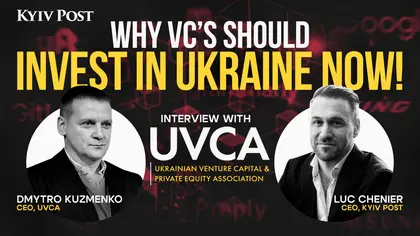How do you manage fiscal revenue when you are in an existential fight for survival requiring massive amounts of cash? The short answer is that you do whatever is takes to survive while planning a wise and coherent strategy for when the war is won.
Various strategies were discussed at the Ukrainian Tax Reform and Anti-corruption Summit 2023, which took place in Kyiv on Thursday, March 23. The invited guests were, among others: Anna Bjerde, vice president of the World Bank for Europe and Central Asia, Tom Palmer, American libertarian writer and theoretician, and Remigius Šimašius, Lithuanian jurist, economist, ex-minister of justice, and mayor of Vilnius.
JOIN US ON TELEGRAM
Follow our coverage of the war on the @Kyivpost_official.
The event was organized by Ukraine’s Office of the President (OP), which was represented by Rostislav Shurma, the deputy head of the OP, as well as the main ideologue of the anti-corruption tax reform.
“The World Bank welcomes this summit because both tax reform and anti-corruption initiatives are two incredibly important elements that Ukraine must deal with, while simultaneously fighting the military invasion of Russia and the task of keeping the economy afloat,” said Anna Bjerde.
She added that Ukraine has been reforming the tax system since 2015, but now this process is complicated by the war. Nevertheless, the reform plays an important role in increasing economic growth, attracting investments and activating the private sector, so it must be implemented sooner or later.

Ukraine Spent Nearly $2.5 Billion for ‘eRecovery’ Program, But It’s Not Yet Enough
“The private sector needs stability and the rule of law,” Bjerde explained. “A combination of these factors, tax reform and anti-corruption measures is what Ukraine needs now. Ukraine has many opportunities to use the experience of the past, to close the gaps that still remain and to cope with the challenge – to do it during the military struggle against the aggressor.”
Andriy Yermak, chief of the OP, believes that tax reform is important. But it must be implemented only after victory.
“Let’s set a goal before our victory to develop such a model that will make it possible to create the most attractive conditions for doing business among competing countries,” he said.
The main goal is to permanently eliminate corruption in the tax sphere.
“There are several very good examples where there was a war or some kind of internal conflict – in particular Ireland and Cyprus – and where after such military actions tax reform was carried out, but not in terms of increasing taxes; rather, in terms of reducing them,” Yermak added.
Although he was not personally present at the summit, he did prepare an address to the guests.
Shurma said that his envisioned future tax reform will increase Ukraine’s competitiveness and raise its investment attractiveness. It will also create favorable conditions for private sector enterprises, which will play a leading role in post-war reconstruction and economic recovery.
“The system that we will propose for the post-war reconstruction of Ukraine should not lose to our competitors, such as Poland, Bulgaria, and Hungary. It is clear that if our income tax is 18%, and in neighboring Bulgaria – 10%, and in Hungary – 9%, certain questions arise. We need a fundamental reset, which will provide competitive conditions and remove all motivation for corruption,” Shurma explained.
The author of the reform believes that after the rate reduction for all types of income tax, changes will begin in other directions. For example, there will be a simplification of the procedures for obtaining permits for the purchase of land plots and construction, a reboot of the law enforcement and judicial system, and the creation of an infrastructure for financing business projects. To implement this, Ukrainian specialists are cooperating with finance and consulting companies, such as BlackRock, JPMorgan and McKinsey.
For now, there is no precise answer as to when there will be a tax reform and what it will look like. The government has stated that reform is not on the agenda during martial law, when roughly one third of Ukraine’s GDP is being spent on security and defense, according to Oleksiy Danilov, secretary of the National Security and Defense Council of Ukraine. And yet, there will be no choice but to implement some sort of reform after the end of the war.
You can also highlight the text and press Ctrl + Enter






